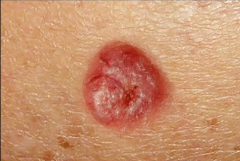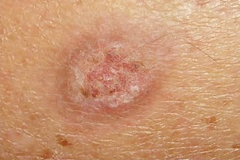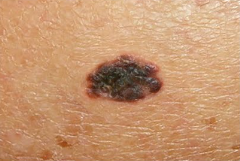Skin cancer is one of the most common forms of cancer in The United States and is becoming even more common every year, especiaslly in Arizona. Skin cancer affects millions of people worldwide and thousands right here Mesa Arizona and surrounding areas. But there is good news! Skin cancer is very treatable in most circumstances, and early detection can make a big difference in the outcome of the disease. In this blog post, we will provide you with a guide on how to tell if you have skin cancer. If you ever have any questions or concerns, please contact your medical professional.
Skin cancer is an abnormal growth of skin cells that can develop due to a variety of reasons, including sun exposure, genetics, and environmental factors. The most common types of skin cancer are basal cell carcinoma, squamous cell carcinoma, and melanoma. The symptoms and signs of skin cancer can vary depending on the type and the severity. Here is what you should look out for.
Basal Cell Carcinoma
Basal cell carcinoma is the most common type of skin cancer. This type of cancer often appears on areas of the skin that have been exposed to the sun, such as the face, scalp, neck, and hands; but can occur nearly anywhere. Some of the sign and symptoms of basal cell carcinoma include:
– A pearly or waxy bump or lesion with visible blood vessels
– A flat, skin-colored or brown scar-like lesion
– A bump or nodule that is pink or red and shiny
– A scratch/pimple/wound that does not heal

Squamous Cell Carcinoma

Squamous cell carcinoma is the second most common type of skin cancer, and it also appears on areas of the skin that have been exposed to the sun. Some of the symptoms of squamous cell carcinoma include:
– A persistent, scaly red patch with irregular borders that may bleed or crust
– A wart-like growth that crusts over and bleeds
– A persistent sore that doesn’t heal or that heals and returns
Melanoma
Melanoma is a more dangerous form of skin cancer and can develop anywhere on the body, even in areas that have not been exposed to the sun. Some of the symptoms of melanoma include:
– A mole that changes size, shape, or color
– A new, unusual growth or a sore that doesn’t heal
– A mole with irregular borders or more than one color
– A mole that is larger than a pencil eraser
If you have any of these symptoms or signs, it is important to talk to your doctor immediately. Your doctor will perform a skin exam, which involves looking at your skin from head to toe to check for any abnormalities. They may also use a dermatoscope, which is a special magnifying tool that allows them to see deeper into the skin.
Your doctor may also perform a biopsy, which involves removing a small sample of skin from the area that looks suspicious. The sample is sent to a lab for further testing, where a pathologist will examine it under a microscope to determine if it is cancerous.

Prevention
The best way to prevent skin cancer is to protect your skin from the harmful effects of the sun. Here are some ways you can do that:
– Wear protective clothing, such as long-sleeved shirts and wide-brimmed hats.
– Use sunscreen with a protection factor (SPF) of 30 or higher, and apply it liberally.
– Seek shade when the sun is strongest, usually between 10 a.m. and 4 p.m.
– Avoid tanning beds and sun lamps, which can also increase your risk of skin cancer.
Conclusion
Skin cancer is a serious condition that can be easily treated if detected early. It is important to be aware of the signs and symptoms of skin cancer and to seek medical attention if you experience any of them. Protecting your skin from the sun is the best way to prevent skin cancer, so be sure to wear protective clothing, use sunscreen, and seek shade whenever possible. Remember, prevention is key when it comes to skin cancer. Lastly, when in doubt, get it checked out. Make an appointment today with Summit View Dermatology in Mesa, Arizona.
